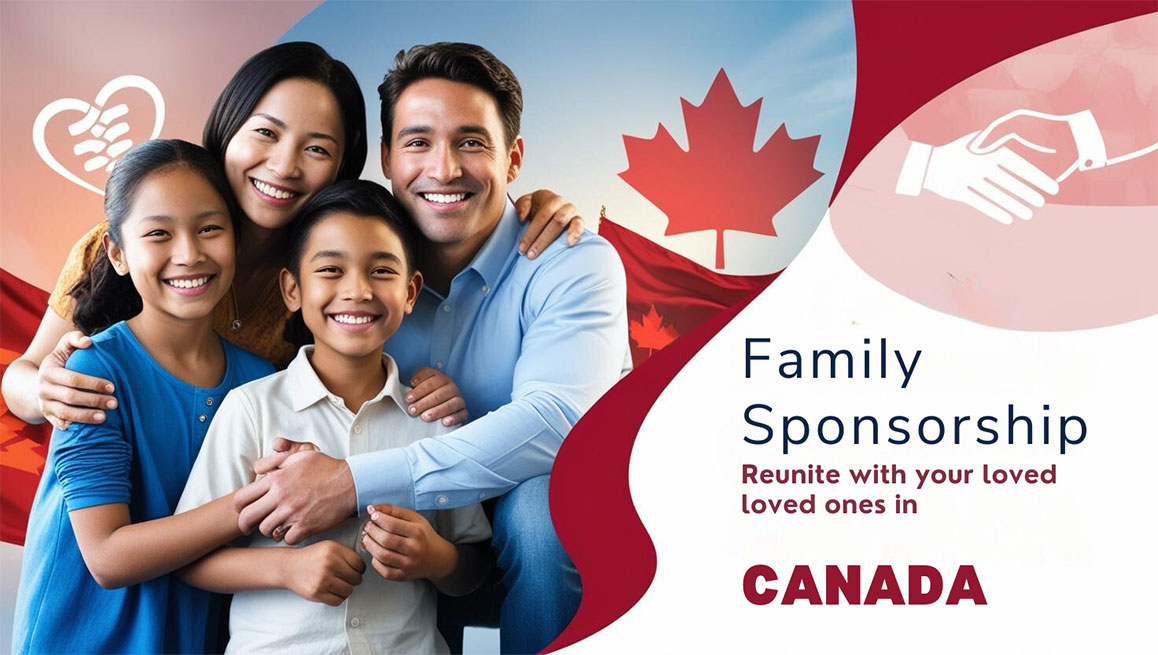Family Sponsorship
Canada’s Family Sponsorship program allows Canadian citizens and permanent residents to bring their loved ones to Canada, helping families reunite and build a life together. The program is a cornerstone of Canada’s immigration policy, enabling families to stay connected, contribute to society, and support each other.
Who Can Be a Sponsor?
To be a sponsor, you must:
- Be at least 18 years old.
- Be a Canadian citizen, permanent resident, or registered under the Canadian Indian Act.
- Reside in Canada (or plan to return to Canada if you’re living abroad).
- Be able to support the sponsored person financially and ensure they do not need social assistance from the government.
Who Can Be Sponsored?
You can sponsor:
- Your spouse, common-law partner, or conjugal partner.
- Your dependent children.
- Your parents and grandparents (by invitation only).
In some cases, you can sponsor other relatives, such as siblings, nieces, nephews, or grandchildren, if they are orphaned, under 18, and not married or in a common-law relationship
Programs under Family Sponsorship
Canada’s Family Sponsorship program includes several categories, each with specific eligibility requirements:
Spouse or Common-Law Partner Sponsorship
- The sponsor must be a Canadian citizen, permanent resident, or registered under the Canadian Indian Act.
- The spouse or common-law partner must be legally married or in a genuine relationship of at least 12 consecutive months.
- The sponsor must be at least 18 years old and able to financially support the spouse or partner.
Inland vs. Outland Spousal Sponsorship
In-Canada Class (Inland Sponsorship):
- Applies to spouses or common-law partners already living in Canada.
- The sponsored person may be eligible for an Open Work Permit while their application is being processed.
- The applicant must maintain legal status in Canada, such as as a visitor, student, or worker, until permanent residency is granted.
Outside Canada Class (Outland Sponsorship):
- Applies to spouses or common-law partners living outside Canada.
- The application is processed through a visa office in the sponsored person’s country of origin or residence.
- The sponsored spouse or partner can still visit Canada during the application process, but they must meet entry requirements each time.
Dependent Child Sponsorship
- The sponsor must be a Canadian citizen, permanent resident, or registered under the Canadian Indian Act.
- The child must be under 22 years old and not have a spouse or common-law partner.
- If the child is 22 years or older, they must be financially dependent on the parent due to a physical or mental condition.
Parents and Grandparents Sponsorship
- The sponsor must be a Canadian citizen or permanent resident.
- The sponsor must meet the Minimum Necessary Income (MNI) for the size of their family unit, including the sponsored parents or grandparents.
- Sponsorship of parents and grandparents is only by invitation. Interested sponsors must submit an interest to sponsor form and be invited to apply.
Parents and Grandparents Sponsorship: Invitation Only
The Parents and Grandparents Sponsorship program is managed through an invitation system. Interested sponsors must submit an online interest to sponsor form. Invitations are issued to eligible sponsors to apply, usually through a random selection process. Only those who receive an invitation can submit a sponsorship application.
Income Requirement for Parents and Grandparents Sponsorship
To sponsor parents and grandparents, you must meet the Minimum Necessary Income (MNI) for the past three consecutive years. This income requirement is based on the size of your family unit, including the sponsored individuals. You must provide proof of income through documents such as Notices of Assessment from the Canada Revenue Agency (CRA).
Frequently Asked Questions (FAQs)
Q1: Is there an IELTS requirement for Family Sponsorship?
A: No, there is no IELTS or language test requirement for Family Sponsorship. However, proficiency in English or French may help the sponsored person integrate more easily into Canadian society.
Q2: Can my spouse apply for a work permit while the sponsorship application is being processed?
A: Yes, if you are sponsoring your spouse or common-law partner through the In-Canada Class, they may be eligible for an Open Work Permit while their permanent residence application is being processed.
Q3: Can my spouse apply for a visitor visa after submitting the sponsorship application?
A: Yes, your spouse can apply for a visitor visa to come to Canada while the sponsorship application is being processed. However, obtaining a visitor visa is not guaranteed, and they must meet the requirements for entry.
Q4: What if the sponsor is living outside of Canada?
A: If you are a Canadian citizen living abroad, you can still sponsor your spouse, partner, dependent child, or other eligible relatives. However, you must demonstrate that you plan to return to Canada and live with the sponsored person once they obtain permanent residency.
Q5: Can I sponsor someone if I am currently unemployed?
A: Being unemployed does not automatically disqualify you from sponsoring a spouse, partner, or child. However, you must prove that you can meet the financial needs of the sponsored person without relying on social assistance. For parents and grandparents, you must meet the income requirements over the past three years.
Q6: How long is the sponsorship undertaking?
A: The length of the sponsorship undertaking varies:
- Spouse, common-law partner, or conjugal partner: 3 years.
- Dependent child: 10 years or until the child turns 25, whichever comes first.
- Parents and grandparents: 20 years.
- Other relatives: 10 years.

